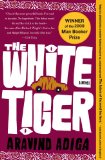Summary | Excerpt | Reading Guide | Reviews | Beyond the Book | Readalikes | Genres & Themes | Author Bio

A Novel
by Aravind Adiga
Yet I bet you they missed the most important clue of all, which was right in front of them:
I am talking of the Black Fort, of course.
I begged Kusum many times to take me to the top of the hill, and through the entranceway, and into the fort. But she said I was a coward, I would die of fright if I went up there: an enormous lizard, the biggest in the whole world, lived in the fort.
So I could only watch. The long loopholes in its wall turned into lines of burning pink at sunrise and burning gold at sunset; the blue sky shone through the slits in the stone, while the moon shone on the jagged ramparts, and the monkeys ran wild along the walls, shrieking and attacking each other, as if they were the spirits of the dead warriors reincarnated, refighting their final battles.
I wanted to go up there too.
Iqbal, who is one of the four best poets in the world -- the others being Rumi, Mirza Ghalib, and a fourth fellow, also a Muslim, whose name I've forgotten -- has written a poem where he says this about slaves:
They remain slaves because they can't see what is beautiful in this world.
That's the truest thing anyone ever said.
A great poet, this fellow Iqbal -- even if he was a Muslim.
(By the way, Mr. Premier: Have you noticed that all four of the greatest poets in the world are Muslim? And yet all the Muslims you meet are illiterate or covered head to toe in black burkas or looking for buildings to blow up? It's a puzzle, isn't it? If you ever figure these people out, send me an e-mail.)
Even as a boy I could see what was beautiful in the world: I was destined not to stay a slave.
One day Kusum found out about me and the fort. She followed me all the way from our home to the pond with the stones, and saw what I was doing. That night she told my father, "He just stood there gaping at the fort -- just the way his mother used to. He is going to come to nothing good in life, I'll tell you that right now."
When I was maybe thirteen I decided to go up to the fort on my own. I waded into the pond, got to the other side, and climbed up the hill; just as I was on the verge of going in, a black thing materialized in the entranceway. I spun around and ran back down the hill, too frightened even to cry.
It was only a cow. I could see this from a distance, but I was too shaken up to go back.
I tried many more times, yet I was such a coward that each time I tried to go up, I lost my nerve and came back.
At the age of twenty-four, when I was living in Dhanbad and working in Mr. Ashok's service as a chauffeur, I returned to Laxmangarh when my master and his wife went there on an excursion. It was a very important trip for me, and one I hope to describe in greater detail when time permits. For now, all I want to tell you is this: While Mr. Ashok and Pinky Madam were relaxing, having eaten lunch, I had nothing to do, so I decided to try again. I swam through the pond, walked up the hill, went into the doorway, and entered the Black Fort for the first time. There wasn't much around -- just some broken walls and a bunch of frightened monkeys watching me from a distance. Putting my foot on the wall, I looked down on the village from there. My little Laxmangarh. I saw the temple tower, the market, the glistening line of sewage, the landlords' mansions -- and my own house, with that dark little cloud outside -- the water buffalo. It looked like the most beautiful sight on earth.
I leaned out from the edge of the fort in the direction of my village -- and then I did something too disgusting to describe to you.
Well, actually, I spat. Again and again. And then, whistling and humming, I went back down the hill.
Eight months later, I slit Mr. Ashok's throat.
Copyright © 2008 by Aravind Adiga
What really knocks me out is a book that, when you're all done reading, you wish the author that wrote it was a ...
Click Here to find out who said this, as well as discovering other famous literary quotes!
Your guide toexceptional books
BookBrowse seeks out and recommends the best in contemporary fiction and nonfiction—books that not only engage and entertain but also deepen our understanding of ourselves and the world around us.